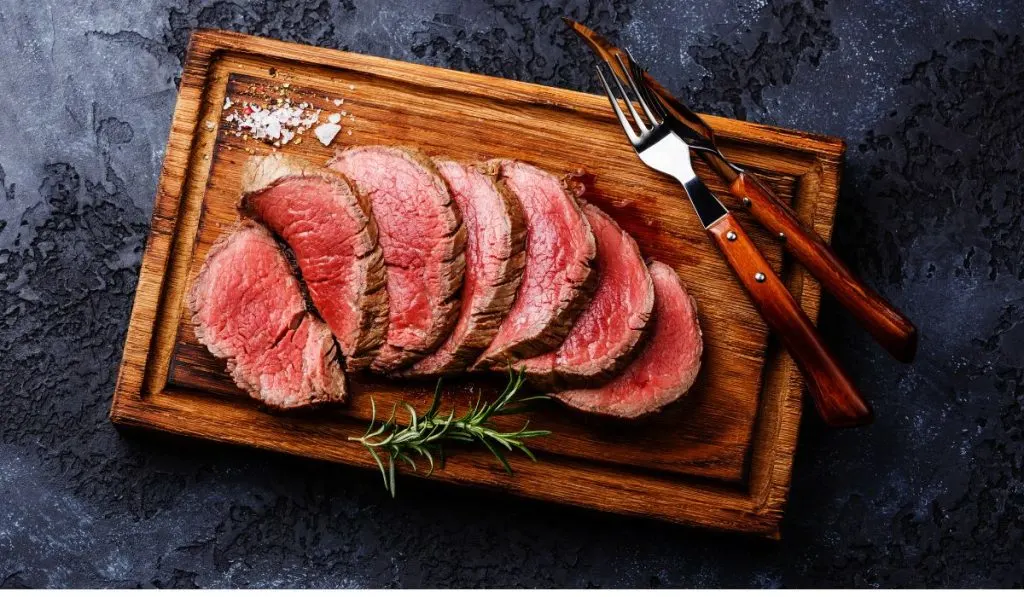
Many of us turn to The Carnivore Diet to lose weight. But is it actually good for weight loss? Well, I have my own experience, which I’ll talk about in a bit, but I’ll also give you a deep dive into why it would or wouldn’t work for losing those excess pounds.
The Carnivore Diet can be a very effective way to lose weight for many people, due to the food keeping you feeling full for far longer than the standard American diet. But individual results can vary considerably.
There are some people who seem to have fat melting off their bodies when eating a meat-based diet, and others, who not only have their weight stay the same, but some people even put weight on when eating this way.
In this article, I’ll take a deep dive into:
- why the carnivore diet is popular for weight loss
- how effective it is for losing weight
- my own experience with the carnivore diet and what happened to my weight
- the nuances around why it works for some people and not others.
Firstly though, what exactly is the carnivore diet? Let’s take a deeper look…
What Is The Carnivore Diet?
Essentially, the carnivore diet consists of consuming only animal products. This would include:
- meat, such as:
- chicken
- elk
- lamb
- organ meats
- seafood, such as:
- fish
- prawns
- lobster
- oysters
- crab
- eggs
- dairy products, such as: (although some choose to cut out dairy due to allergens or intolerances)
- butter
- milk
- yoghurt
- cheese
NOTE: The above is a general list of foods included in the carnivore diet, but there are different ‘rules’ depending on the approach you take. Some carnivores also include other foods such as fruit and honey, whereas others restrict themselves to only beef!
Can You Lose Weight on The Carnivore Diet?
Many people have reported success in shedding pounds on this diet, but it’s important to consider the potential benefits and drawbacks of the Carnivore Diet for weight loss to decide if it is right for you.
We all know that the basic principle of weight loss involves consuming fewer calories than your body burns. The Carnivore Diet can lead to weight loss for some, as the high protein and fat content of the foods increases satiety, which potentially leads to a reduction in overall calorie intake.
In other words, most people end up eating a lot less because they are getting far fuller with less calorie intake, with protein and fat being much more filling than other foods. In addition to this, the carbohydrate intake is so little, that it helps keep hunger cravings at bay due to reduced sugar spikes.
However, as I mentioned earlier, not everyone sees an immediate weight loss with an all-meat diet, (which we’ll get into later). And it’s also very important to understand the pros, cons, limitations and risks of this kind of diet before deciding if it is right for you.
Let’s talk about some of the ways the carnivore diet can help with weight loss, and then we’ll cover why it may not work…
Why Does the Carnivore Diet Help with Weight Loss?
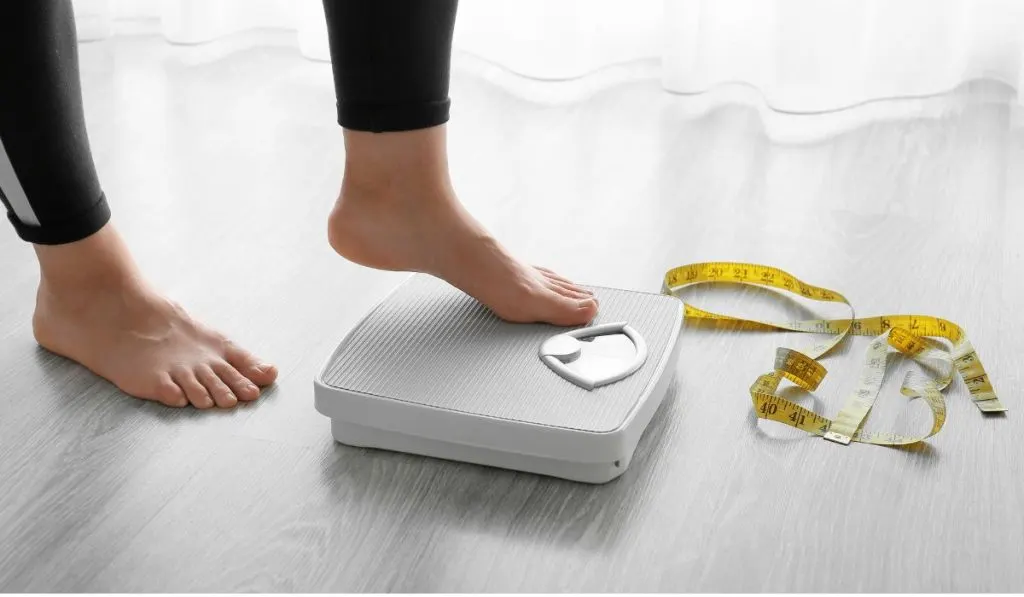
Here are 5 reasons that the carnivore diet can potentially help with weight loss…
#1: The Carnivore Diet is Highly Nutritious, So You Feel Satisfied
While the carnivore diet might seem unusual at first, it’s a diet that focuses on providing essential nutrients from animal-based sources. And the nutrients found in animal based sources tend to be much more ‘bio-available‘ to the human body.
In other words, the nutrients found in meat, can be used by the human body much more easily than the nutrients found in other foods like grains and vegetables. In fact, including organ meats as part of your diet means you are eating one of the most nutrient dense foods on the planet!
Consuming a wide range of animal products gives you high quality bio-available nutrients such as:
- omega 3 fatty acids
- iron
- zinc
- selenium
- vitamin D
- vitamins B6 and B12
- iodine
- and many more
When you are getting good quality nutrients into your body, it helps everything to work efficiently. And this, in turn, can help you to lose excess weight, as your body is getting what it needs.
Many weight loss methods involve calorie restriction, or missing out foods that are truly needed for the body to function properly. The problem with this, is that eventually your body starts to physically seek these nutrients, making it only a matter of time before giving in to the foods that your body needs to do well.
The carnivore diet has the advantage of being full of nutrient dense foods that are very satiating, making it:
- Easier to stick to
- Easier to eat less food
- Easier to eat less often
So, this is an advantage of the carnivore diet that helps if you want to lose weight.
#2: The Carnivore Diet is Highly Satiating, Which Makes Easier to Eat Less
One of the benefits of an all-meat diet, is how satiating it is. I was shocked at how my body just didn’t seem to feel hungry in the same way at all once I had made the switch to eating this way.
Because you are consuming foods that are nutrient dense, and high in protein and fat, you feel satisfied after every meal, and you stay full for a long time before you want more food.
This of course helps incredibly when it comes to resisting those cheeky snacks in between meals and eating more calories than you realize!
#3: The Carnivore Diet is Low-Carb, Which Helps Alleviate Cravings
Another aspect of the carnivore diet that could benefit weight loss is its low-carb nature. This diet can be a completely zero-carb (if you’re having no dairy) or extremely low-carb (dairy has a few carbs) diet, helping you keep your blood sugar levels relatively low.
When you eat fewer carbohydrates, blood sugar levels tend to remain relatively stable, and this helps to avoid energy dips, which reduces cravings and spikes in hunger levels that often come with carbohydrate-heavy diets, ultimately allowing you to better manage your appetite and portion sizes.
The diet shares some similarities with keto, also known as the ketogenic diet. Both are low in carbohydrates and high in fat, which can promote ketosis – a metabolic state where your body begins to burn fat for fuel instead of glucose.
NOTE: If you’d like a direct comparison between the Keto & Carnivore diet, check out my article here.
In fact, you could look at the Carnivore Diet almost as an extension, or a further/more extensive version of the ketogenic diet, which has been a good tool for many trying to lose weight.
This shift to fat-burning mode is advantageous, as it encourages your body to utilize its fat stores for energy.
DID YOU KNOW? The Carnivore diet doesn’t necessarily keep you in ketosis. For more information, check out my article here.
#4: The Carnivore Diet Has a Higher Thermic Effect, Which Helps Burn More Calories
Being on the Carnivore Diet means consuming a lot of foods that have a thermic effect on your body (animals proteins do this to you). What this means is that your body has to burn more energy to digest it compared to other macronutrients. So, this not only burns more calories, but it also boosts your metabolism, which can help with weight loss.
FUN FACT: People on the Carnivore Diet tend to run on the hot side for this very ‘thermic’ reason. When I made the switch, I certainly noticed that I didn’t need to wear my hoodie anyway near as often as I used to!
#5: The Carnivore Diet is Super Simple, Making It Easier to Stick To
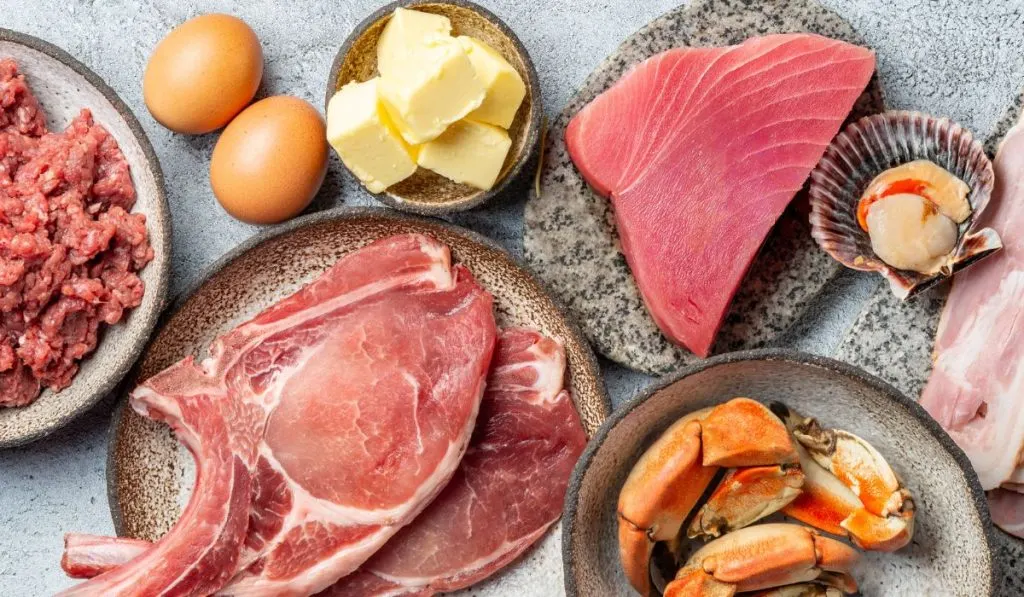
I don’t know about you, but I’ve seen some super complicated weight loss diets! For me, the simplicity of the carnivore diet was a big BIG plus in helping me to stick to it.
There is zero overwhelm, because the ‘rules’ are so simple, making it so easy to follow. In fact, any other diet I’ve tried has left me craving something ‘off-plan’ at some point. But on carnivore, this hasn’t happened so far and I am 4 months in!
It takes all the thinking, planning, preparation, etc. out of the equation altogether. You don’t need to ‘remember’ if this food is or isn’t allowed, or stick to particular cooking methods, or understand how much of something you are allowed or if you have reached your limit of a food for the day/week or not.
It is so simple. If it is from an animal, you can eat it. And you can eat it whenever or however you want. That’s it! In my opinion, this makes it easier to lose weight. Because you just have one simple rule to follow, and that is it.
I found that it meant my entire focus didn’t have to be on my diet. I could focus on other things in my life without my new way of eating taking over my life.
Of course, it’s essential to remember that everybody is unique, and weight loss success may vary from person to person. Which brings me on my next point…
If all the above benefits of the Carnivore Diet help you lose weight….then why do some people put on weight, or simply stay the same weight?
Why Do People Struggle to Lose Weight on the Carnivore Diet?
First things first, it goes without saying, we are all individuals. And what works for one person, won’t always work for another person. However, there are some legitimate reasons why you may not lose weight on the Carnivore Diet, along with some tips to try out in case this is you…
#1: The Carnivore Diet May Feel Too Restrictive
For me personally, I welcomed the idea of not having to think on this diet, and have my choices made easy for me. But for others, it may be the opposite. It may feel too restrictive, and the lack of variety could potentially cause someone to get bored and sway from this way of eating.
TIP: Check out my article here to learn “How Sustainable Is The Carnivore Diet Long Term?“
If this is you, then remember to add as much variety as you possibly can and include several different items with each meal. For example, instead of opting for steak at every meal, try a portion of air-fried chicken wings, with meatballs on the side, topped with fried eggs.
You can even serve it with a cream cheese and egg yolk sauce for an extra dip on the side. This will help you feel like you are having a variety of things to eat.
#2: The Body May Be Prioritizing Healing First
When you are on an all-meat diet, with zero or almost zero carbs coming in, your body starts to do some amazing things:
- No (or very little) sugar spikes in the blood
- Longer time period between meals
- Using fat stores in your body for energy instead of sugars from your foods
These things combined, give your body a break from having to:
- constantly produce insulin
- Be busy digesting your food pretty much all day
Your body never normally gets a break from doing these things, which happen to be quite consuming for the body. But because you have a constant and even amount of energy coming from your fat stores, and because you are having quite long gaps between each meal, the body has more resources available.
Because the body can take a break from constantly spiking insulin and digesting foods, it can use more resources towards fixing all of those bits and bobs it just couldn’t spend time and energy on before.
And guess what? The body doesn’t care if your priority is to lose weight. The body will prioritize whatever is the most troubling matter in your body at the time. And extra fat on your body is not going to be a priority if you have an underlying leaky gut to heal, or mis-shapen blood cells or low bone density.
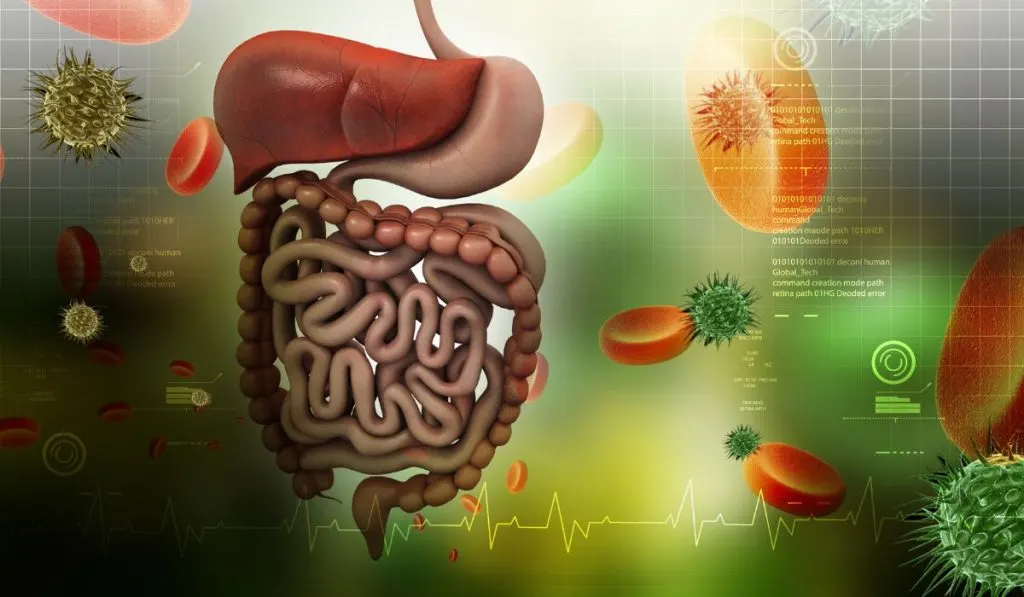
All things that it couldn’t prioritize before because it was too busy digesting all the food that was coming in and regulating the sugar levels in your blood to a safe level. And of course, many things in the body may be broken or not optimal, but we don’t actually feel any symptoms until it gets much worse.
So even if you are not aware of any issues going on in your body, it doesn’t mean there aren’t any.
If this is you, then you’ll need to be patient and continue this way of eating until your body has had a chance to heal itself. Only then, will it let go of the excess fat. For more detailed information on how long it may take before you see results, check out my article here.
TOP TIP: Focus on how this way of eating is making you feel. Do you have more energy? Has your skin improved? These are all signs that you’re doing what is good for your body, regardless of what it says on the scales.
Another tip to help speed up healing, is to do intermittent fasting along with the carnivore way of eating. This can prove to be extremely healing for the body in combination and may help you to lose the weight quicker, due to the body’s healing being sped up.
#3: You May Have Underlying Health Issues
Many people, like me, came to this way of eating due to underlying health conditions that they were fully aware of, and are using the meat only diet to help heal themselves. If this is you, then for the reasons I mentioned in the previous point, your body may choose to hold onto fat while it is healing.
And you may need a longer time period before you can actually see weight loss results. If you do have an underlying health condition, then it is really important not to try and restrict yourself from eating when you are hungry. Even if it seems like ‘you have eaten enough’.
Trust your body to know what it is doing and eat when you need to eat. Eventually, you will stop feeling as hungry when your body is ready to let go of the extra fat, but for now, give your body what it needs until it has been given enough nutrition to heal itself.
Again, fasting can also be another option to add in to the mix to help speed things up in this situation, but never start both things simultaneously. Start eating carnivore style first, and when your body has had some time to adjust, you can slowly begin fasting, while making sure you are getting enough calories in too.
IMPORTANT: Make sure you get the support of a healthcare professional if doing longer fasts and ensure it is done safely.
#4: You May Be Consuming Too Many Calories
Although eating a meat only diet can be very satiating, you may still be consuming too many calories. And although there is quite a bit of debate at the moment about how much calories actually matter, the rule still applies.
If you are eating too many calories for your body, you won’t be able to lose weight.
Having said that though, please bear in mind my previous points about your body prioritizing healing. If your goal is to heal first, you should think about the weight loss after you start feeling better.
If your goal is to lose weight, try including intermittent fasting as a way to help you control the amount of calories you are consuming.
TOP TIP: Try reducing the amount of protein you are consuming whilst increasing your fat intake. This can help you shed those more stubborn pounds.
Another thing you can do is start moving more (health permitting of course). Getting your body more active, whether that be through daily movement like walking or taking the stairs, or through exercise, moving your body more will help use up more of the calories that you are eating.
#5: Your Body May Still Be Adapting
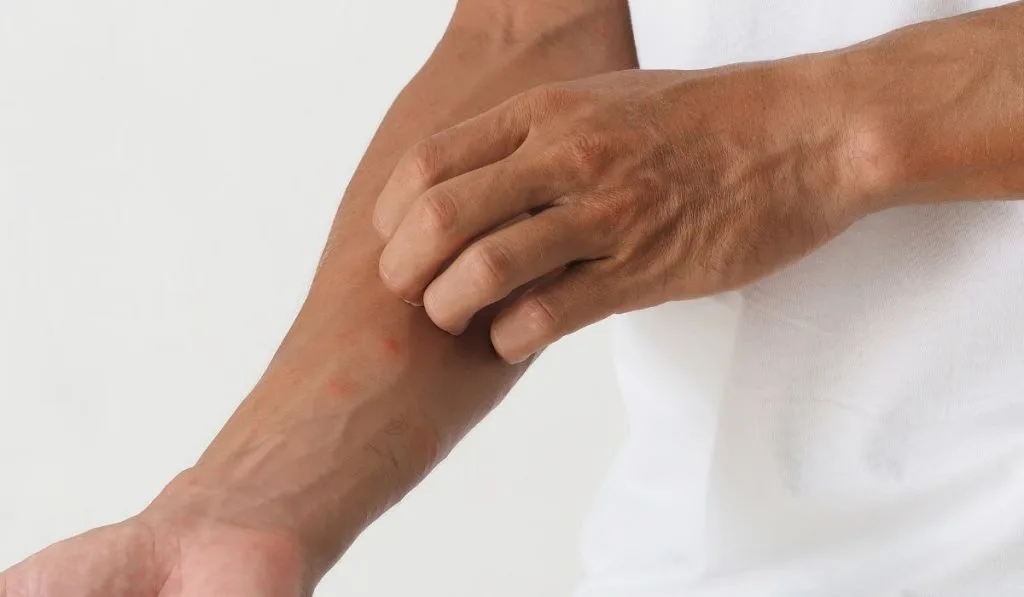
If you’ve gone cold turkey and moved from a standard American diet to eating only meat, then your body has got a BIG adjustment to make. You will be going through an adjustment period that can last anything from 2 weeks, to 3 to 6 months!
During this time, if you are one of the lucky ones, you may simply start feeling better straight away. But if you’re anything like me, you will go through an adaptation period where you will experience some symptoms such as:
- skin rash (sometimes known as ‘keto rash’)
- fatigue
- aches and pains
- and many more
During this adaptation period, I suggest you don’t worry about weight loss, as your body is already going through enough by trying to adapt to the new way of eating. Wait until you feel better before worrying about what is on the scale. The pounds will shift once the body is ready!
NOTE: During the adaptation phase, sugar cravings can also be a big hurdle. For some helpful tips on beating sugar cravings on the carnivore diet, check out my article, “19 Effective Ways to Deal with Sugar Cravings on the Carnivore Diet.” I discuss both long and short term ways to beat those cravings for good!
I didn’t lose weight immediately. In fact, it took me more than 3 months of adaptation symptoms before I started to see a very slow and gradual weight loss. But I did see other benefits within that time, such as my energy levels returning, and my skin clearing up.
Although it was disappointing and demotivating that the scales didn’t move for the first 3 months on Carnivore, I had so many health issues that I needed to fix first. So, I just kept going. And eventually I got to a point where I only needed/wanted to eat once or twice a day. My appetite finally decreased, and the weight started to come off.
By which point, I had already started to see so many other benefits anyway, regardless of how much I weighed at the time.
#6: You May Need to Ditch Dairy
If you are consuming dairy, and struggling to lose weight on the carnivore diet, try cutting it out to see if that helps.
So many of us have an intolerance to dairy, without even knowing it. And one of the symptoms of dairy intolerance? You guessed it! It’s weight gain!
TOP TIP: Look at dairy as a ‘treat’ rather than a main part of the diet. Have a bite or two if you want an occasional dessert, or serve a little on the side with your main meal. Many of us go too ‘dairy-heavy’ on Carnivore and end up gaining weight.
#7: You May be Losing Fat but Putting on Muscle
As I mentioned earlier, when I started carnivore, I didn’t see any weight loss at all. Nothing. Not until 3 months in. But my body changed very dramatically during this time regardless of the scales staying the same. And this is a very common occurrence.
Many carnivores find that their weight stays exactly the same, but they notice that their clothes are fitting differently. I lost inches off my waist, felt more energetic, and could feel the difference in the way my clothes fit me.
Why did it take 3 months before I saw any noticeable difference on the scales? I believe my body was prioritizing healing first. I suffered from severe fibromyalgia and ME/Chronic Fatigue Syndrome. It was debilitating and left me housebound for a long time.
So for me, going on a meat only diet wasn’t to lose weight, even though I was 60lb overweight. It was to get my life back. And it definitely did that, with weight loss being a bonus once my body had healed enough to let go of the excess weight. To read my full story, click here.
My point is, you may be putting on muscle and/or losing fat, and that is why it may seem as though you are not losing weight when in fact you are. It is just that you are losing fat, which won’t always show up on the scale if you have also put on some muscle.
In conclusion, while the carnivore diet has some features that could potentially support your weight loss goals, it’s crucial to consider other factors such as:
- overall lifestyle
- level of physical activity
- other health issues.
It’s also important to keep expectations realistic and prioritize our long-term health above all else.
Important Things to Note About The Carnivore Diet

It’s extremely important to bear in mind that the although the carnivore diet may be effective for weight loss for most people, you must make sure you are being safe. This will include:
- Getting support/supervision from your healthcare practitioner
- Taking into account any health conditions
- Taking into account medications
- Keeping a close eye on your blood levels and other health markers.
A drastic change in diet can affect how medications are received by the body, so if this is you, please speak with your healthcare practitioner before embarking on this kind of diet, so that you can stay safe.
Something else to consider is how these diets affect individuals with diabetes or other health concerns related to blood sugar levels.
The Carnivore Diet has a BIG impact on blood sugar levels, and so this needs careful consideration, supervision and planning with someone who is knowledgeable about your condition.
It’s essential to look at the complete picture when deciding which diet is right for you. The carnivore diet might be a good option if you want something super simple and easy to follow.
In my experience, the carnivore diet helps with weight loss because it focuses on high protein, high fat, low carbohydrate intake, and elimination of processed foods source high in sugars and unhealthy fats. However, it’s important to consider health issues when embarking on this diet.
Weight loss and optimal health can be achieved through various methods, and it’s essential to find an approach that suits your unique needs and lifestyle. I found the Carnivore Diet to be what worked for me long term but it’s important for every person to make informed decisions to maintain long-term health and well-being.
Frequently Asked Questions
What are some potential side effects of the carnivore diet?
During the initial phase of moving to a meat-based diet, it is normal to go through some symptoms while your body adapts. This can include:
- constipation or diarrhea
- bad breath
- skin rash
- fatigue
The symptoms typically last 2 to 3 weeks for most people and should subside after this. Taking electrolyte supplements can help relieve these symptoms.
Are there any disadvantages to the carnivore diet?
Yes, there are some disadvantages to the carnivore diet. For some people, it could get really boring, although you may be pleasantly surprised at how happy you are to continue eating this way. The other disadvantages are:
- socializing may become tricky
- the adaptation phase could be hard to go through
- you may find it hard to withdraw from carbs initially
How does the carnivore diet compare to the keto diet for weight loss?
Both the carnivore diet and keto diet emphasize high-fat and low-carb meals. Nevertheless, the carnivore diet is more restrictive, as it eliminates most plant-based foods. Keto, on the other hand, allows for a broader range of food choices, including non-starchy vegetables and some fruits.
Depending on personal preferences and individual needs, one might find either the carnivore or keto diet more effective for weight loss. Check out my article here, where I give a full comparison between Keto & Carnivore.
What should a female carnivore diet plan include?
From my experience, a female carnivore diet plan is not too different from a male one. The only exception is to take female fluctuating hormones into consideration. This would mean there may be certain times of the month where you need to eat more, and vice versa. It is important to listen to the body’s individual needs.
